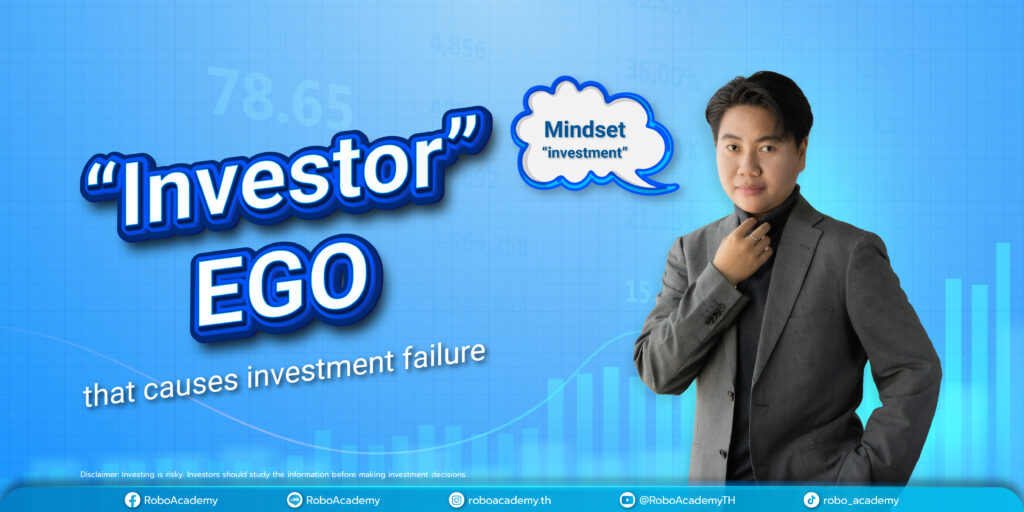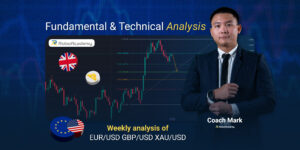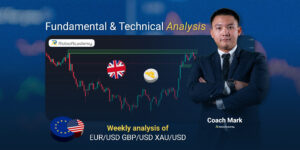The Ego of the “Investor” Causes Investment Failure.

In trading, many are familiar with the saying “I know this, I know that.” This phrase is most common with ego-driven investors who hate losing mostly due to their own decision making. Let’s take a look at the biases that ego investors face and how to prevent this from happening to you.

อีโก้ของนักลงทุน ในตลาด
Unable to control oneself or difficulty to control yourself (Self-Control Bias) is common with investors who set long-term investment goals. For the investment portfolio of this group of investors, they usually invest in dividend stocks. Deciding between spending for short-term happiness or investing in funds that pay dividends so one can use the dividends to buy happiness first is the usual dilemma. On hindsight, stocks or funds that do not pay dividends have better long-term returns.

ความรู้สึกสูญเสีย มีมากกว่าชัยชนะ (Loss Aversion)
On average, traders feel more losses than wins (Loss Aversion). It’s a textbook saying where, “If you don’t sell, you don’t lose.” This bias prevents investors from selling unprofitable stocks because of fear of loss. It seems that the stock shows no signs of going back up but investors are willing to hold stocks until the price returns. On the other hand, when stocks go up, investors with this bias will rush to sell stocks because of fear that the stock market will go down. This limits the investors’ profits. Instead, investors should limit their losses and increase the opportunity to make a profit.

The stock market did not perform as expected. You have to find reasons that will make you feel comfortable (Cognitive Dissonance).
This is what investors face when receiving new information about the market or stock inconsistent with their own understanding. Traditional investment attitudes, emotions, beliefs, or values that one believes in cause discomfort. One deals with dilemma and it forces one to find reasons to reduce that unpleasant feeling (Cognitive Dissonance).

Already knowing that it must be like this (Hindsight Bias)
Traders feel like they already know what it should be like in trading. But in reality, events are unpredictable. Investors who have this bias usually say when stocks fall, “Historical Bias” or “This stock will go down, it’s a shame I didn’t sell first”. Investors overestimate the market’s predictability. In other words, they underestimate the uncertainty of the market.

อยู่แบบเดิม ทำแบบเดิมๆ ก็ยังดี (Status Quo Bias)
ที่พวกเขารู้จักหรือเกี่ยวข้องเนื่องจากไม่ต้องการงการเปลี่ยนแปลง (ภาวะอคติ) โดยธรรมชาติของมนุษย์จะมีความเฉื่อยชา ซึ่งหมายความว่าทุกสิ่งที่มีอยู่แล้วไม่ถึงกับแย่เสมอไปจนไม่อยากให้เปลี่ยนแปลงอะไร

ไม่อยากเจ็บจากการตัดสินใจผิดพลาด
อคตินี้เกิดขึ้นเพราะว่าเราไม่อยากเจ็บปวดจากการกระทำหรือสิ่งที่เราตัดสินใจลงไป สิ่งที่เกิดจากการตัดสินใจของเราเองมันจะทำให้เราเจ็บกว่าเดิมสองเท่า จนเกิดการให้นักลงทุนตัดสินใจถือสินทรัพย์ที่มีความเสี่ยงต่ำ และถือนาน เพราะไม่อยากรู้สึกแย่จากการตัดสินใจพลาดอีก
ติดตามสาระดีๆ และข่าวสารต่างๆได้ที่เพจ 𝗥𝗼𝗯𝗼𝗔𝗰𝗮𝗱𝗲𝗺𝘆 หรือช่องทางอื่นๆ
- LineOA : https://lin.ee/U2wJicl (@RoboAcademy)
- Facebook : facebook.com/RoboAcademyTH
- Instagram : instagram.com/roboacademy.th
- YouTube : youtube.com/RoboAcademy
Disclaimer : การลงทุนมีความเสี่ยง ผู้ลงทุนควรศึกษาข้อมูลก่อนการตัดสินใจลงทุน


